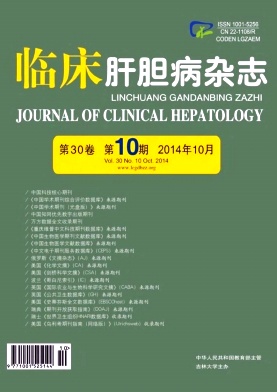Objective To assess the predictive value of Glasgow Prognostic Score ( GPS) system for mortality in patients with acute-on-chronic liver failure associated with hepatitis B ( HBV-ACLF) . Methods The clinical data of 437 patients who were diagnosed with HBV-ACLF and admitted to the Department of Infectious Diseases, The First Affiliated Hospital of Xinjiang Medical University, from April 2008 to April 2012 were retrospectively evaluated. Patients were grouped according to their GPS scores, and the mortality rates were compared between GPS groups. Continuous data in normal distribution were compared by t test between two groups and by F-test between three or more groups. Comparison of categorical data was made by chi-square test. COX proportional hazards regression was performed to identify clinical variables associated with overall survival during the follow-up period [30 ( 5-825) d]. Results The mortality rate of patients with HBV-ACLF was 68. 0% ( 297 cases) during the follow-up period. The group with higher GPS scores had significantly increased proportions of individuals with gastrointestinal bleeding, hepatic encephalopathy, and hepatorenal syndrome and higher Model of End-Stage Liver Disease scores ( P < 0. 05 across all variables) . COX proportional hazards regression analysis revealed the risk factors closely associated with the mortality of patients with HBV-ACLF, which included hepatic encephalopathy ( grade I-II vs absence of hepatic encephalopathy: hazard ratio, HR: 2. 520, 95% confidence interval, CI: 1. 479-4. 293, P = 0. 001; grade III-IV vs absence of hepatic encephalopathy: HR:3. 678, 95% CI: 1. 920-7. 047, P < 0. 001) , hepatorenal syndrome ( HR: 2. 374, 95% CI: 1. 452-3. 881, P = 0. 001) , gastrointestinal bleeding ( HR: 1. 616, 95% CI: 1. 153-2. 262, P = 0. 004) , antiviral therapy ( HR: 0. 668, 95% CI: 0. 518-0. 862, P = 0. 002) and the GPS ( 1 vs 0: HR: 2. 055, 95% CI: 1653-2. 702, P = 0. 001; 2 vs 0: HR: 4. 520, 95% CI: 3. 288-6. 932, P = 0. 007) . Conclusion The GPS system has a good predictive value for short-and long-term mortality in patients with HBV-ACLF. Elevated GPS is an independent risk factor for death in patients with chronic liver failure associated with hepatitis B.









 本站查看
本站查看




 DownLoad:
DownLoad: